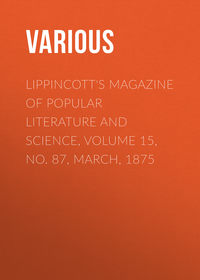Kitabı oku: «Lippincott's Magazine of Popular Literature and Science, Volume 15, No. 87, March, 1875», sayfa 2
Various
Bir şeyler ters gitti, lütfen daha sonra tekrar deneyin
Türler ve etiketler
Yaş sınırı:
0+Litres'teki yayın tarihi:
17 kasım 2018Hacim:
290 s. 1 illüstrasyonTelif hakkı:
Public Domain